|
Books Should Be Free Loyal Books Free Public Domain Audiobooks & eBook Downloads |
|
|
Books Should Be Free Loyal Books Free Public Domain Audiobooks & eBook Downloads |
|
Religion |
|---|
|
Book type:
Sort by:
View by:
|
By: Hamilton Wright Mabie (1846-1916) | |
|---|---|
 Fruits of the Spirit
Fruits of the Spirit
A collection of essays written by the renowned lecturer and author during the First World War, when he was quite depressed. The general themes of the collection are persevering in faith, guidance by the Holy Spirit and standing for the "Test of Courage". - Summary by Beth Thomas | |
By: Handley Carr Glyn Moule (1841-1920) | |
|---|---|
 Christus Consolator: Words for Hearts in Trouble
Christus Consolator: Words for Hearts in Trouble
This book is intended principally to remind those whose hearts the European War has stricken of the hope and comfort which lie ready for their wounds in our Lord Jesus Christ. I shall be glad indeed if anything in my pages may bring help to other sorrowing souls; for grief and death do not suspend their normal visitation among us, the infliction of the sore pains and losses of common life, because of their tremendous activities today on the field of battle, in the war-hospital, and on the deep. But I have written with these latter troubles more directly in view... | |
 Epistle of St Paul to the Romans
Epistle of St Paul to the Romans
He who attempts to expound the Epistle to the Romans, when his sacred task is over, is little disposed to speak about his Commentary; he is occupied rather with an ever deeper reverence and wonder over the Text which he has been permitted to handle, a Text so full of a marvellous man, above all so full of God. It remains only to express the hope that these pages may serve in some degree to convey to their readers a new Tolle, Lege for the divine Text itself; if only by suggesting to them sometimes the words of St Augustine, "To Paul I appeal from all interpreters of his writings." | |
By: Hannah Trager (1870-1943) | |
|---|---|
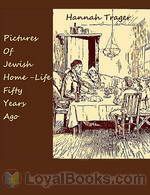 Pictures of Jewish Home-Life Fifty Years Ago
Pictures of Jewish Home-Life Fifty Years Ago
Hannah Trager published Pictures of Jewish Home-Life Fifty Years Ago in 1926, so the book is a portrait of day to day life for a Jewish family in Jerusalem around 1876. In each chapter, Mr. Jacobs reads a letter from his cousins living in Jerusalem many years earlier, each one teaching his family and friends about a different holiday or tradition of their people. (Introduction by wildemoose) | |
By: Hannah Whitall Smith (1832-1911) | |
|---|---|
 The God of All Comfort
The God of All Comfort
This book is written to Christians who profess to believe the Bible as God's revelation, but whose "lives are filled with discomfort and unrest." Smith aims to show that the Bible's claim that God is the "the God of all comfort" is not an over-advertisement or misunderstanding, but that it is possible to avail ourselves of the doubts and heavy anxieties that plague so many Christians.By explaining God's part and man's part, Smith aims to show her readers that it is possible to overcome feelings of defeat and despair and find rest and peace in Christ... | |
 Christian's Secret of a Happy Life
Christian's Secret of a Happy Life
This Christian book is written in a easy and understandable way, where the strong biblical points are clear and and applicable. The richness of the truths explained, will make one want to listen to it over and over again. The book writes about our part and God's part in the Christian life. It also reveal many secrets to the Christian life. "Today it is your happy privilege to prove, as never before, your loyal confidence in the Lord by starting out with Him on a life and walk of faith, lived moment by moment in absolute and childlike trust in Him." quote from the book. It is a must listen to Christian classic. | |
By: Hargrave Jennings (1817-1890) | |
|---|---|
 Phallic Worship
Phallic Worship
A fairly scholarly, short survey of religious sexual symbols and practices from ancient times to the near-present, and within various countries and religions. The essay is coloured by liberality and acceptance of common themes between different religions. Note: "phallic" in the context of this work refers to both male and female genitalia. | |
By: Harold Bell Wright (1872-1944) | |
|---|---|
 The Shepherd of the Hills
The Shepherd of the Hills
The story depicts the lives of mountain people living in the Ozarks and the mystery surrounding an old man called ‘The Shepherd of the Hills,’ who’s called Dad Howitt. The backdrop storyline surrounds the pretty Samantha Lane, called Sammy, and her love of Young Matt, Grant Matthews. The shepherd, an elderly, mysterious, learned man, escapes the buzzing restlessness of the city to live in the backwoods neighborhood of Mutton Hollow in the Ozark hills. | |
By: Harriet Beecher Stowe (1811-1896) | |
|---|---|
 Religious Studies, Sketches and Poems
Religious Studies, Sketches and Poems
Best known for having written "Uncle Tom's Cabin," Harriet Beecher Stowe also wrote several religious works, including the works in this book. The first section (Religious Studies) was originally published as "Footsteps of the Master," and was included in this compilation along with a selection of works from her book "The May Flower." The poetry included was published at irregular intervals and have been included in this compilation as well as others. | |
By: Helen Ekin Starrett (1840-1920) | |
|---|---|
 Letters to a Daughter and A Little Sermon to School Girls
Letters to a Daughter and A Little Sermon to School Girls
Helen Ekin Starrett, journalist, mother of two daughters, grandmother of seven granddaughters and teacher to many young girls at the Starrett School for Girls offers lessons in life and religion to girls about to "pass out from the guardianship of home into life with its duties and trials". | |
By: Helen Marshall Pratt | |
|---|---|
 Understanding English Cathedrals: Terminology, Architecture, Organization, And Personnel
Understanding English Cathedrals: Terminology, Architecture, Organization, And Personnel
This recording comprises chapters from two different works: How To Visit The English Cathedrals by Esther Singleton, and The Cathedral Churches Of England by Helen Marshall Pratt. Each book devotes a chapter to each cathedral, but this recording includes only the introductory chapters of general information. - Summary by David Wales | |
By: Helena Petrovna Blavatsky (1831-1891) | |
|---|---|
 Secret Doctrine.Volume I. Cosmogenesis.Part II. The Evolution Of Symbolism.
Secret Doctrine.Volume I. Cosmogenesis.Part II. The Evolution Of Symbolism.
In this work of comparative religion, ontology and epistemology, Mme. Blavatsky presents science as a belief system of as much value as others in contributing to human knowledge of the seven secret keys to understanding through mathematics and intuition. A comparative study of ancient texts and their commentators over more than three thousand years. | |
By: Henry Charles Lea (1825-1909) | |
|---|---|
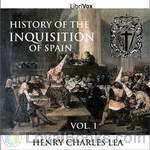 History of the Inquisition of Spain
History of the Inquisition of Spain
The first volume of Lea’s monumental work on the Inquisition of Spain, covering its origin and establishment and its relations with the state. Also included are appendices listing Tribunals, Inquisitors-General, and Spanish coinage. | |
 History of the Inquisition of Spain, Vol. 3
History of the Inquisition of Spain, Vol. 3
The 3rd volume of Lea's monumental work on the Spanish Inquisition. This volume covers torture practices; the trial process; punishments; Jews, Moriscos, and Protestants; and censorship. - Summary by Sienna | |
 History of the Inquisition of Spain, Vol. 4
History of the Inquisition of Spain, Vol. 4
The fourth and final volume of Lea's monumental work on the Spanish Inquisition. This volume discusses how the Inquisition dealt with mysticism, solicitation of illicit relationships, bigamy, theological propositions, witchcraft and sorcery, political activity, and almost every other facet of daily life. It concludes with an overarching history of the Inquisition and retrospective. | |
By: Henry Drummond | |
|---|---|
 The Greatest Thing in the World and Other Addresses
The Greatest Thing in the World and Other Addresses
The spiritual classic The Greatest Thing In the World is a trenchant and tender analysis of Christian love as set forth in the thirteenth chapter of I Corinthians. The other addresses speak to other aspects of Christian life and thought. | |
By: Henry Edward Manning (1808-1892) | |
|---|---|
 The Love of Jesus to Penitents
The Love of Jesus to Penitents
Henry Edward Manning (1808-1892) was an Oxford-educated Anglican clergyman who converted to Roman Catholicism after the Privy Council ordered the Church of England in 1850 to reinstate an heretical vicar. Manning was ordained a priest in the Roman Catholic Church in 1851, appointed archbishop of Westminster in 1865, and made a cardinal in 1875 by Pope Pius IX.In The Love of Jesus to Penitents, Manning enumerates the many benefits that the Sacrament of Penance affords the penitent: it reveals to the... | |
By: Henry Rider Haggard (1856-1925) | |
|---|---|
 Pearl Maiden
Pearl Maiden
This is the story of Miriam, an orphan Christian woman living in Rome in the first century. She falls in love with a Roman officer, but knows that her Jewish childhood playmate loves her too and will do anything in order to get her love in return. | |
By: Henry Scougal (1650-1678) | |
|---|---|
 The Life of God in the Soul of Man
The Life of God in the Soul of Man
Henry Scougal was born in Scotland in 1650. The son of the Bishop of Aberdeen, he flourished under rigorous teaching to become Professor of Philosophy at King's College, Aberdeen. In 1672, Scougal was ordained minister in Auchterless and, after a year, returned to King's College as Professor of Divinity. He continued in this office until his death in 1678.The Life of God in the Soul of Man is, in reality, a letter of doctrine and encouragement to a friend wavering in the faith, and was never intended for publication... | |
 Life of God in the Soul of Man (Version 2)
Life of God in the Soul of Man (Version 2)
“In many ways we are still living in the spiritual momentum that was created during the Great Awakening…and in the midst of the Great Awakening there was one man that was most singularly used by God…that man was the great evangelist, George Whitefield.” Published in 1677, The Life of God in the Soul of Man was originally penned in 1676 as a private letter to a friend by 26 year-old Henry Scougal, professor of divinity at King’s College, University of Aberdeen. Less than a century later,... | |
By: Henry Thayer Niles (1825-1901) | |
|---|---|
 The Dawn and the Day
The Dawn and the Day
The Dawn and the Day, or, The Buddha and the Christ, Part 1 is a text similar to the epic poetry of Homer or, more accurately, classic Hindu texts, such as the Baghavad-Gita. | |
By: Henry van Dyke (1852-1933) | |
|---|---|
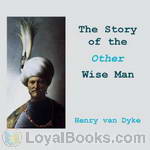 The Story of the Other Wise Man
The Story of the Other Wise Man
You know the story of the Three Wise Men of the East, and how they travelled from far away to offer their gifts at the manger-cradle in Bethlehem. But have you ever heard the story of the Other Wise Man, who also saw the star in its rising, and set out to follow it, yet did not arrive with his brethren in the presence of the young child Jesus? Of the great desire of this fourth pilgrim, and how it was denied, yet accomplished in the denial; of his many wanderings and the probations of his soul;... | |
By: Herbert Allen Giles (1845-1935) | |
|---|---|
 Religions of Ancient China
Religions of Ancient China
An overview of the religions of China, beginning with Fu Hsi, B.C. 2953-2838, and continuing through the 19th Century. | |
By: Herbert J. Hall (1870-1923) | |
|---|---|
 The Untroubled Mind
The Untroubled Mind
A very wise physician has said that “every illness has two parts—what it is, and what the patient thinks about it.” What the patient thinks about it is often more important and more troublesome than the real disease. What the patient thinks of life, what life means to him is also of great importance and may be the bar that shuts out all real health and happiness. The following pages are devoted to certain ideals of life which I would like to give to my patients, the long-time patients who have especially fallen to my lot. | |
By: Hermann Gunkel | |
|---|---|
 The Legends of Genesis
The Legends of Genesis
The Legends of Genesis is the English translation of the introduction to Gunkel’s massive commentary, Genesis. Gunkel uses form critical analysis on the text of Genesis to determine the various genres of the biblical legends and their significance to the authors. Gunkel also uses form criticism to uncover buried clues as to the constituent sources of the text. Gunkel offers his hypothesis to explain how the various sources came to be combined and redacted, and how the text later came to be attributed to Moses. | |
By: Hermann Witsius (1636-1708) | |
|---|---|
 Conciliatory or Irenical Animadversions on the Controversies Agitated in Britain under the Unhappy Names of Antinomians and Neonomians
Conciliatory or Irenical Animadversions on the Controversies Agitated in Britain under the Unhappy Names of Antinomians and Neonomians
The Antinomian-Neonomian controversy of the 17th century was initiated by the republication of a set of sermons by Tobias Crisp entitled "Christ alone exalted" which were accused of antinomianism by Richard Baxter who in turn was accused of 'neonomianism', "the idea that Christ has, by his atonement, so lowered the requirements of the law that mere endeavor is accepted in room of perfect obedience." "The name antinomianism is a comparatively modern designation of several types of ethical thought in which hostility to the Mosaic law and to the principles therein embodied has led to immoral teaching and practise... | |
By: Hermas | |
|---|---|
 Shepherd of Hermas
Shepherd of Hermas
The Shepherd of Hermas is a Christian work likely from the late first half of the second century. It was considered inspired scripture by some of the early Church fathers such as Irenaeus and Origen, but not Tertullian. The Shepherd was very popular amongst Christians in the 2nd and 3rd centuries, and is found in some Bibles after the Acts of the Apostles. The book is made up of five allegorical visions granted to Hermas, a former slave. This is followed by twelve mandates or commandments, and ten similitudes, or parables. | |
By: Hesba Stretton (1832-1911) | |
|---|---|
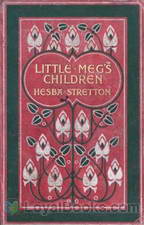 Little Meg's Children
Little Meg's Children
This is the touching and endearing story of Little Meg and her trials and difficulties as she does her best to look after 'her children' after their mother dies. Father is away at sea and is expected every day, but when father's ship comes in he is not aboard! With the help of her new friend and neighbour Kitty, she finds out that he was 'took bad' on the other side of the world, who knows when or if he will ever make it back. Meanwhile, Little Meg must take care of Robby and baby. There are better days and worse days... | |
 Jessica's First Prayer and Jessica's Mother
Jessica's First Prayer and Jessica's Mother
Jessica is a little girl who used to be an actress till she grew too big. Now she lives on the streets, mostly starving until she meets Mr. Dan'el. Mr. Dan'el gives Jessica his cast-off crusts and warmed-over coffee. Jessica follows Mr. Dan'el to a building where a bunch of people sing and then listen to a man tell them about someone named God. Jessica wants to know who God is so she sneaks into listen every Sunday, hoping she won't be found out. | |
By: Hester Travers Smith (1868-1949) | |
|---|---|
 Oscar Wilde from Purgatory
Oscar Wilde from Purgatory
Hester Dowden, who wrote under the name Hester Travers Smith, was an Irish spiritualist medium. She claimed to have communicated with the spirits of various celebrities. In Oscar Wilde from Purgatory, she reproduces the text of her "conversations" with the Irish poet and playwright, conducted via a Ouija board and automatic writing. Wilde proves just as talkative after death as he was in life. His spirit revels in the complements paid to his work by Travers Smith and her colleagues, describes how it feels to exist without a body, and pronounces James Joyce's recently published novel Ulysses a "great bulk of filth"... | |
By: Hilaire Belloc (1870-1953) | |
|---|---|
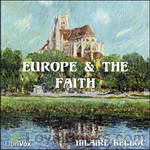 Europe and the Faith
Europe and the Faith
The Catholic brings to history (when I say "history" in these pages I mean the history of Christendom) self-knowledge. As a man in the confessional accuses himself of what he knows to be true and what other people cannot judge, so a Catholic, talking of the united European civilization, when he blames it, blames it for motives and for acts which are his own. He himself could have done those things in person. He is not relatively right in his blame, he is absolutely right. As a man can testify to his own motive so can the Catholic testify to unjust, irrelevant, or ignorant conceptions of the European story; for he knows why and how it proceeded... | |
By: Hippolyte Dreyfus-Barney (1873-1928) | |
|---|---|
 The Universal Religion: Bahaism - Its Rise and Social Import
The Universal Religion: Bahaism - Its Rise and Social Import
“Bahaism is not a new religion,” writes Hippolyte Dreyfus-Barney, “It is religion renewed… it does not pretend to represent the whole Truth; on the contrary, it recognises Truth in fundamental principles which are the basis of all former dispensations, and which for that very reason form the standpoint of concord too long lost sight of. And it requires people to renounce ancient superstitions, to abandon the dead letter in order to be penetrated by the living and vivifying spirit, then by... | |